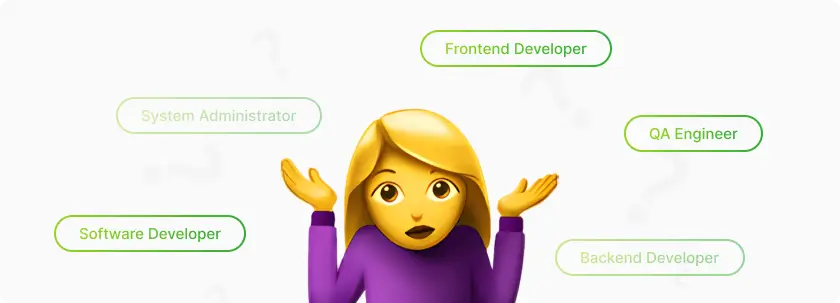
The IT industry is one of the most widespread in the 21st century and is gaining popularity every year. The IT industry covers a wide range of specialties that can be used in any business area. In the IT field, everyone can find a profession to their liking and develop in this direction. In this article, we will look at the main IT professions, their responsibilities, advantages and disadvantages.
Who is an IT specialist?
An IT specialist is an information technology professional who develops, maintains, administers, or secures software. The word “IT specialist” has always sounded quite promising, but during the Covid-19 pandemic, when remote work was gaining popularity, this term became even more popular and respectable.
What IT specialties are there?
Software Developer
Programmers write, test, and maintain code for software. They can specialize in different programming languages such as Java, Python, C++, JavaScript, etc.
Main tasks
- Developing and writing code.
- Testing and debugging programs.
- Collaborating with other team members to create and improve software.
Required skills
To become a programmer, you need to learn at least one programming language (the more the better), be able to solve problems and think logically, and understand algorithms and data structure.
Advantages of working as a programmer
- High demand on the labor market.
- Ability to work remotely from home or another part of the world.
- Ample opportunities for career growth.
Disadvantages
- Constant need to update and expand your skills.
- High level of stress due to deadlines.
- A sedentary lifestyle can have a negative impact on health.
Backend Developer
Backend developers deal with the server side of web application development, logic, and databases.
Main tasks
- Development of the server (backend) part of applications.
- Integration with databases.
- Ensuring security and optimization of server code.
Required skills
To get a job as a backend developer, you need to know programming languages, be able to work with databases, and understand the architecture and structure of web applications.
Advantages of working as a backend developer
- High demand in the labor market. The functioning of web applications and websites is very important for IT companies, so they all need an experienced backend developer.
- Work with a variety of technologies and programming languages.
- High salary.
Disadvantages.
- High complexity of work.
- The need to know many technologies.
- Good technical training is required.
Frontend Developer
Front-end developers create the interface of web applications and websites for easy use.
Main tasks
- Developing and optimizing the interface of websites or applications.
- Collaboration with designers to implement layouts.
- Ensure compatibility with various browsers and devices.
Required skills
To work as a front-end developer, you need to know HTML, CSS, and JavaScript, understand the principles of UI/UX design, and be able to work with frameworks (React, Angular, etc.).
Advantages of working as a front-end developer
- Direct impact on user interaction with the application or website and influence on conversion.
- High demand in the labor market.
- The possibility of a creative approach to work.
Disadvantages
- Constant change of technologies.
- High requirements for design and UX.
- The need for close cooperation with designers.
System Administrator
System administrators are responsible for setting up, maintaining, and managing the IT infrastructure, including servers, networks, and security systems. Data security is one of the key elements of information technology and requires close supervision.
Main tasks
- Setting up and maintaining servers and networks
- Monitoring systems and fixing errors.
- Ensuring data security.
Skills required
To work as a system administrator, you need to be familiar with operating systems (Windows, Linux), understand networking technologies, and be able to quickly respond to problems and think critically to solve them.
Benefits of working as a system administrator
- Stable work in various industries. This IT profession is important for any business in the 21st century.
- High level of responsibility and influence on the organization.
- Demand in companies of all sizes and industries.
Disadvantages.
- Possible work outside of business hours due to the need to respond quickly to problems.
- The need to constantly monitor systems.
- High responsibility for the smooth operation of the company’s infrastructure.
QA Engineer
Testers check the quality of software, identify and fix errors.
Main tasks
- Writing tests for software.
- Using manual and automated testing.
- Identifying and documenting bugs.
Required skills
In order to get a job as a tester, you need to understand software development processes, be very attentive to details, and know the tools for automated testing.
Benefits of working as a tester
- A key role in ensuring the quality of an IT product.
- Possibility to move to other areas of software development. For example, to become a developer.
- Relatively low entry threshold.
Disadvantages
- Monotony of work.
- Possible conflicts with developers due to detected errors.
- The need for attentiveness and scrupulousness.
Database Administrator
Database specialists manage, configure, and secure databases.
Main tasks
- Management and optimization of databases.
- Ensuring data security and backup.
- Supporting and restoring data in case of failures.
Required skills
To work with databases, you need to know SQL and other database query languages, be able to work with different types of databases, and understand the principles of data storage and processing.
Benefits of working as a database specialist
- High demand for specialists.
- Ability to work in various industries.
- Stable work.
Disadvantages
- High responsibility for data integrity.
- The need to work with large amounts of information.
- The need to constantly update their knowledge and skills.
DevOps Engineer
DevOps engineers automate the processes of software deployment, integration, and monitoring.
Main tasks
- Automation of CI/CD processes.
- Monitoring and maintaining system performance.
- Ensuring software stability and security.
Required skills
To start working as a DevOps engineer, you need to know scripting languages (Python, Wash, etc.), have experience with automation tools, and understand the principles of CI/CD and configuration management.
Benefits of working as a DevOps engineer
- High demand for such specialists.
- Ability to influence all stages of software development.
- High salary.
Disadvantages
- The need to know many technologies.
- High responsibility for system stability.
- The need for continuous training.
Cybersecurity Analyst
Cybersecurity analysts protect information systems from cyberattacks and ensure data confidentiality and integrity.
Main tasks
- Analyzing threats and vulnerabilities.
- Implementation of data protection measures.
- Investigating security incidents.
Required skills
To start your career as a cybersecurity analyst, you need to know network protocols and technologies, understand the principles of cryptography, and be able to use tools to analyze the security of a website, database, or application.
Benefits of working as a cybersecurity analyst
- Growing demand for specialists.
- High level of influence on the company’s operations.
- Various tasks and continuous development.
Disadvantages
- High level of stress.
- Great responsibility for the result.
- Unpredictable working hours during cyber incidents.
Conclusion
In fact, there are many more IT specialties, but these are the main ones that all information technologies are based on. The main advantages of any IT profession are high salaries, the possibility of remote work, and IT career growth. The main disadvantages of working in IT are high stress levels, the possibility of burnout, and the need for constant learning.
The choice of profession depends on your preferences and skills, but in IT, anyone can find an interesting field and develop in this direction.












